The multidimensional and colorful world of mobile games has two major ports with their own ships and their own rules. In everyday life, we talk about them as iOS vs Android development. A certain systematic architecture cannot balance completely different approaches to development, design, maintenance, and subsequent marketing activities.
If you have made a decision to create a mobile game, then you probably know that mobile traffic currently rules the world. As of December 2023, mobile devices account for 58.67% of all Internet traffic in the world, while desktop computers account for just 41.33%. But if you are here, then you are not quite sure which development platform to choose. No problem, because we have gathered here for a reason.
Let’s figure out what is the difference between iOS and Android development and which platform is better to choose for your mobile game.
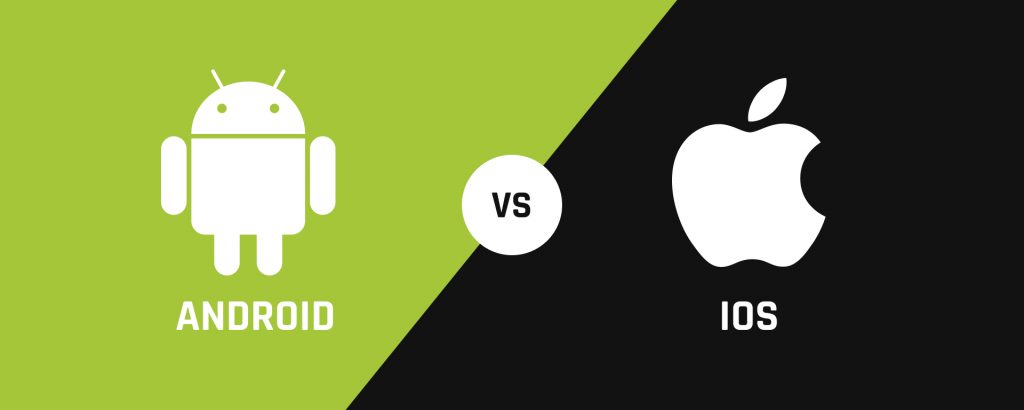
What Is the Difference? iOS vs Android Development
The key difference lies in the very name of this so-called confrontation.
Development of Android games means the process of creating entertainment products for devices operating on the Android operating base.
It was originally developed by Android, which was later acquired by the American multinational Google. It is based on Linux and Google’s own implementation of the Java virtual machine. Android is a free operating system, which is why most smartphone manufacturers use it.
IOS game development means the process of creating entertainment products for devices running the iOS operating system.
The developer of the system is the American corporation Apple, which also develops all devices that support iOS. It is a closed ecosystem that no outsider can enter.
Business Side of iOS vs Android App Development
When planning to create a game, you probably want it to be not only interesting for the players, but also profitable for you. That is why, when choosing a platform, it is necessary to take into account the statistical results of market research regarding the strengths and weaknesses of each of the platforms. Here’s what we have at the moment.
Market Share
The first observations of market share clearly demonstrate that the number of Android devices significantly exceeds that of iOS alone. Manufacturers compete with each other to add as much functionality to the smartphone as possible and at the same time make it even cheaper. Due to this, in terms of quantity, Android unconditionally surpasses iOS, and this is confirmed by the Statcounter study – almost 76% versus 19% speak for themselves.
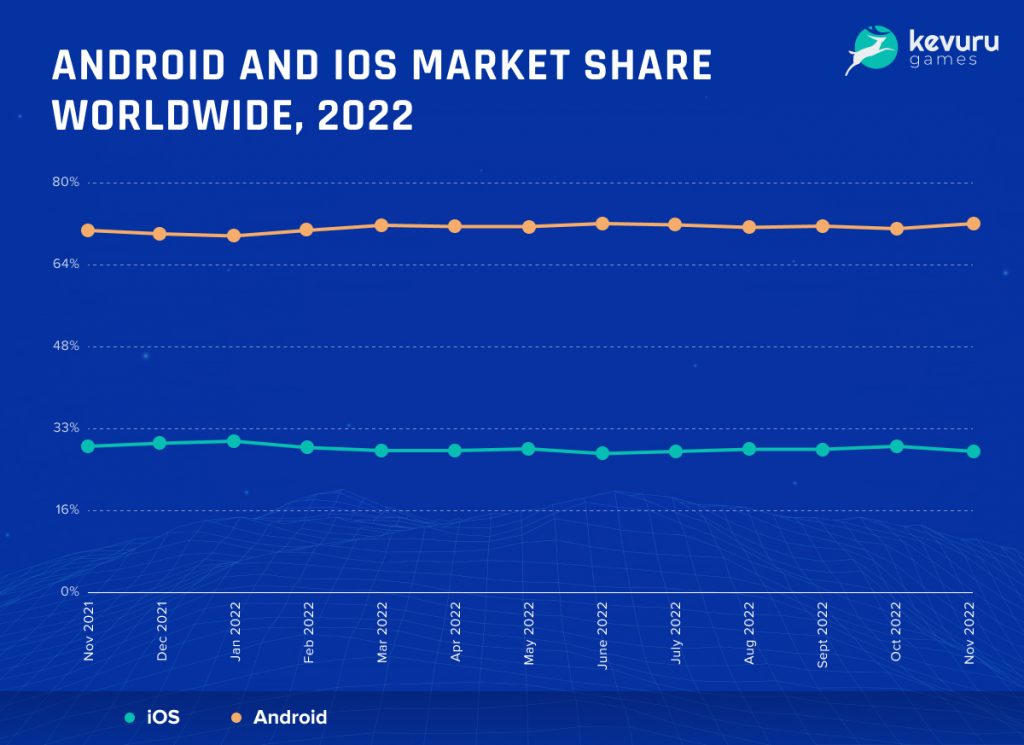
But wait, it’s too early to draw any conclusions about iOS vs Android development choice.
Platform Revenue
It would seem that the more users, the more income. And here lies the insidious mistake.
The App Store has been ahead of Google Play for many years. The same thing happened in 2022. The year showed off the power of App Store, with $88 billion spent by players on subscriptions, in-app purchases, and premium apps, compared to $53 billion generated by Google Play. These numbers raised further in 2023.
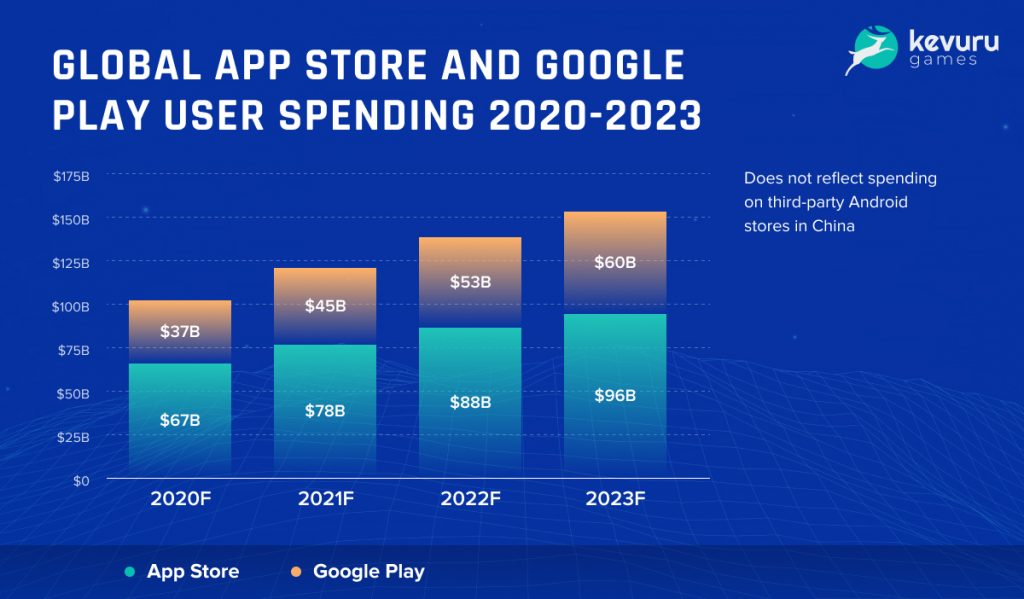
Interestingly, according to the comparative data of the first half of 2021 and 2022, consumer spending in the App Store increased slightly from 41.4 billion in 2021 to 43.7 billion in 2022, while in Google Play it fell from 23 billion in 2021 to 21.3 billion in 2022. Customers are expected to spend 125 billion dollars (USD) on mobile apps through the Apple App Store in 2027. By 2027, it’s anticipated that combined consumer spending on Google Play and the App Store would approach 186 billion dollars. When compared to the total consumer spending recorded by the two biggest app distributors in 2022, this would indicate a growth of more than 50%. The projected app spending for 2023–2024 has dropped significantly from previous estimates due to the decreasing growth pattern of the digital market.
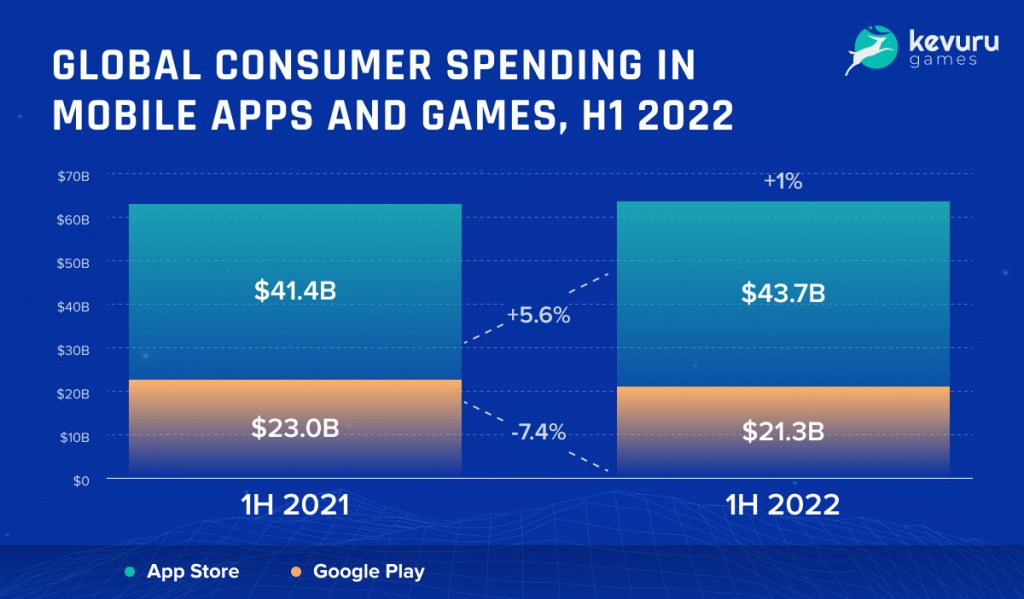
Number of Downloads
If iOS has more profit, then more downloads? Nothing of the sort! Don’t forget the number of Android devices on the market. Android significantly outperforms iOS in terms of downloads and mostly generates its revenue through ads. A large number of downloads guarantees a large number of ad impressions and profit from them.
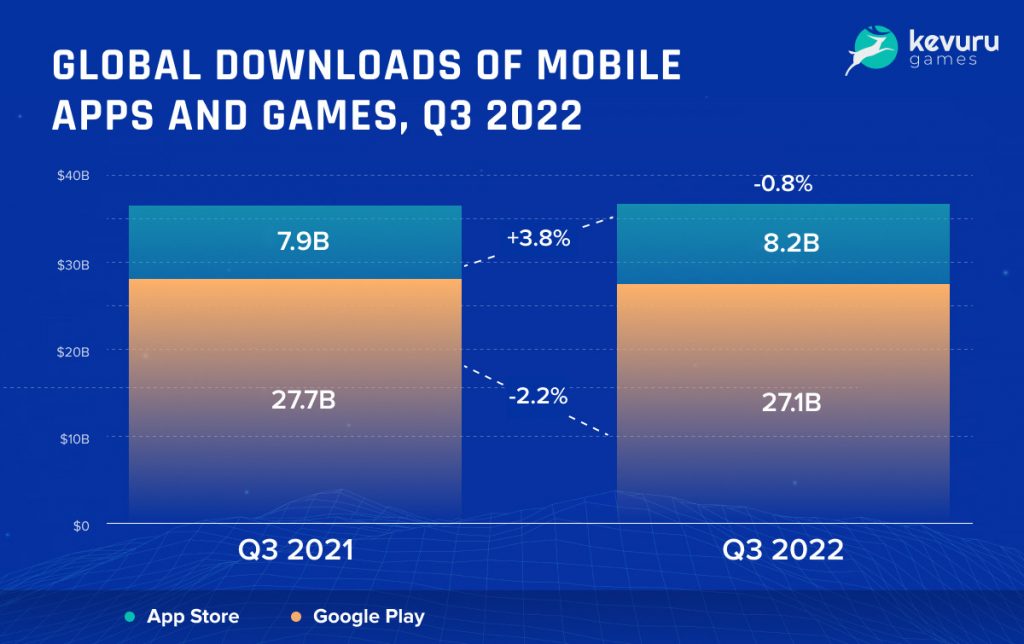
Technical Side of Android vs iPhone Development
The technical side plays an important role when choosing a platform. Having understood the specifics of Android vs iOS app development for each of them, you can decide which one is more preferable for you in terms of cost and simplicity.
Programming Language
Android vs iOS game development is very different in technical terms. Android has an open-source code, so it can be easily adapted for thousands of different devices. The iOS code is closed and works only on Apple devices.
Android favors Java and sometimes Kotlin, while iOS has retained the right to exclusivity here too – applications for it can only be written in the Swift language specially created for it. Until it was widely adopted, iOS programmers used the compiled object-oriented programming language Objective-C.
Is iOS development easier than Android? Novice programmers agree that learning Swift is much easier and faster than mastering Java, so they often join the teams of their iOS colleagues. However, the increasing adoption of Kotlin may make a difference – it is expected to soon replace Java due to its simplicity, intuitiveness, and ease of readability.
Development Intricacy
Android development can be more complex due to platform fragmentation, with numerous devices running different OS versions and varying screen sizes. Conversely, iOS development is generally considered less complex due to its closed ecosystem, standardized hardware, and software specifications.
Designing Applications
Android offers greater flexibility in UI/UX design, while iOS emphasizes standardized design principles with Human Interface Guidelines (HIG). Android’s Material Design and iOS’s design language enable developers to create visually appealing and intuitive interfaces.
Integrated Development Environment
Here we are talking about a set of software tools used by programmers to develop software. It also differs when developing for Android vs iOS.
For Android, the free Eclipse used to be the most popular medium. For a long time it was considered the main one, it was actively developed and gained a huge army of fans among programmers. The company’s developers have regularly improved Eclipse by releasing updates, creating new tools, and introducing useful features for programmers. In this environment, you can connect additional modules to expand its functionality.
Now the relatively new Android Studio IDE, created by Google in 2013, is worthy of the competition. This program for developing a mobile application supports several programming languages, including C/C++ and Java, has a built-in emulator, and a large library with all kinds of templates and components that greatly simplify and speed up the app development process. Android Studio can run on almost any device without restrictions.
For iOS, developers also rely on Apple’s own invention, Xcode. It is an integrated software development environment for OS X and iOS that has a user-friendly interface, autocomplete support, and many other features that make Swift development easier. You need to understand that Xcode only works on MacBooks, so be sure to consider this when choosing a platform.
Interesting fact. Despite the most diverse opinions and the presence of supporters of both Android Studio and Xcode, the former still wins the race of developer preferences. Perhaps this is due to the greater number of Android developers, or maybe objective reasons also influenced the final verdict. Programmers often complain about the instability of Xcode, the inability to run multiple simulators at the same time, and problems with documentation. And while Android Studio is often accused of being slow and sluggish, it is stable and has no documentation gaps.
Development Speed
In matters of iOS versus Android development speed, there is no doubt. Obviously, development on iOS is much faster due to testing – a limited number of exclusively Apple devices greatly speeds up this process.
It’s not that simple with Android games. There are a lot of device manufacturers working with Android, and this should be taken into account during testing. Usually, several different devices are taken at once, from the most modern and from the older ones. After fixing the bugs, the game should be tested again on all these devices. Since skipping the testing phase equates to suicide, you must immediately take into account the duration of this stage when developing games for Android.
But that’s not all. Development for Android takes much longer for a number of reasons. Let’s list them along with what has already been stated above for a better understanding:
- More code. Java is not as concise as Swift or Objective-C. Its verbosity means more hours of work and more work for testers to find bugs.
- Slow emulators. The best Android emulators are much slower than simulators for iOS.
- Fragmentation. It is necessary to test a huge number of devices, and the error can be found even on the most seedy Chinese smartphone, which is sold only in Latvia.
- XML layout. The programmer often has to build the layout manually using Android’s XML vocabulary as opposed to the WYSIWYG methods common for iOS.
Due to all this, Android game developers often need 30-40% more time to create a mobile game application than the creators of the iOS version. For example, if we estimate the time to create a game app for iOS at 700 hours (just over 4 months), then for Android we estimate the creation of the same game and charge it at about 900 hours (5.5 months).
Testing of Applications
Android app testing involves compatibility testing across various devices and OS versions, requiring real device testing alongside emulators. iOS testing is more straightforward due to device uniformity, with Apple’s Xcode providing built-in testing tools and simulators.
Testing of applications is a crucial aspect of the software development process, ensuring that the application functions as intended and meets the requirements and expectations of users. Testing involves identifying and resolving defects, errors, and performance issues to deliver a high-quality and reliable product. Various types of testing can be conducted throughout the development lifecycle to validate different aspects of the application:
- Unit Testing: Testing individual components or units of code to verify their correctness and functionality in isolation from the rest of the application.
- Integration Testing: Testing the interactions and interfaces between different components or modules to ensure they work together as intended.
- Functional Testing: Testing the functional requirements of the application to verify that it performs the expected operations and produces the desired outputs.
- Regression Testing: Testing to ensure that changes or enhancements to the application do not introduce new defects or regressions in existing functionality.
- Performance Testing: Testing the performance and scalability of the application under different load conditions to assess its responsiveness, stability, and resource utilization.
- Security Testing: Testing the application for vulnerabilities and weaknesses to identify and mitigate potential security risks and threats.
- Usability Testing: Testing the usability and user experience of the application to ensure it is intuitive, easy to navigate, and meets the needs of its target users.
- Compatibility Testing: Testing the application across different devices, browsers, operating systems, and environments to ensure it functions correctly and displays consistently across various platforms.
- Accessibility Testing: Testing the accessibility features of the application to ensure it is usable by people with disabilities and complies with accessibility standards and guidelines.
- User Acceptance Testing (UAT): Testing the application with end users to validate its suitability for real-world use and gather feedback for further improvements.
Security and Privacy of Applications
Android has faced security concerns in the past due to its open nature, but measures like Google Play Protect and app sandboxing enhance security. iOS boasts robust security features and a strict app review process, prioritizing user privacy and data protection.
Security Measures:
- Implement robust authentication and authorization mechanisms to control access to sensitive data and features.
- Encrypt data transmission and storage to prevent unauthorized access and protect user privacy.
- Use secure coding practices to mitigate common vulnerabilities such as SQL injection, cross-site scripting (XSS), and buffer overflows.
- Regularly update and patch software components to address known security vulnerabilities and weaknesses.
- Conduct security audits and penetration testing to identify and remediate potential security risks and vulnerabilities.
Privacy Measures:
- Adhere to privacy regulations and compliance standards such as GDPR, CCPA, and HIPAA to protect user privacy and data rights.
- Provide transparent privacy policies and obtain user consent for data collection, processing, and sharing activities.
- Minimize data collection and retention to only what is necessary for the application’s functionality and user experience.
- Implement data anonymization and pseudonymization techniques to protect user identities and sensitive information.
- Educate users about privacy risks and best practices for safeguarding their personal information while using the application.
Development Time and Cost
There is no escape from the question that interests everyone. What is the cost of developing iOS app vs Android app? Are the required investments for android and iOS game development very different?
There are several nuances that are worth paying attention to:
- There are purely hardware costs that you have to face in iOS development. We have already said that Android Studio installs perfectly on any computer with any system, whereas Xcode only requires a MacBook. Accordingly, you have to provide your programmers with modern MacBooks. It will cost you a pretty penny.
- In some regions of the world, iOS developers receive a slightly higher salary due to the increased requirements for iOS games in the App Store. Integration of payment systems and specific administrative panels requires increased attention, while Android development is more flexible and customizable.
- We have also mentioned some of the awkwardness of developing for Android due to the need to take into account the technical features of various devices. It is also much slower than that for iOS. More development time means more pay for developers.
Developer hourly rates vary by region. The highest are in the US and the UK, and the lowest are in India.
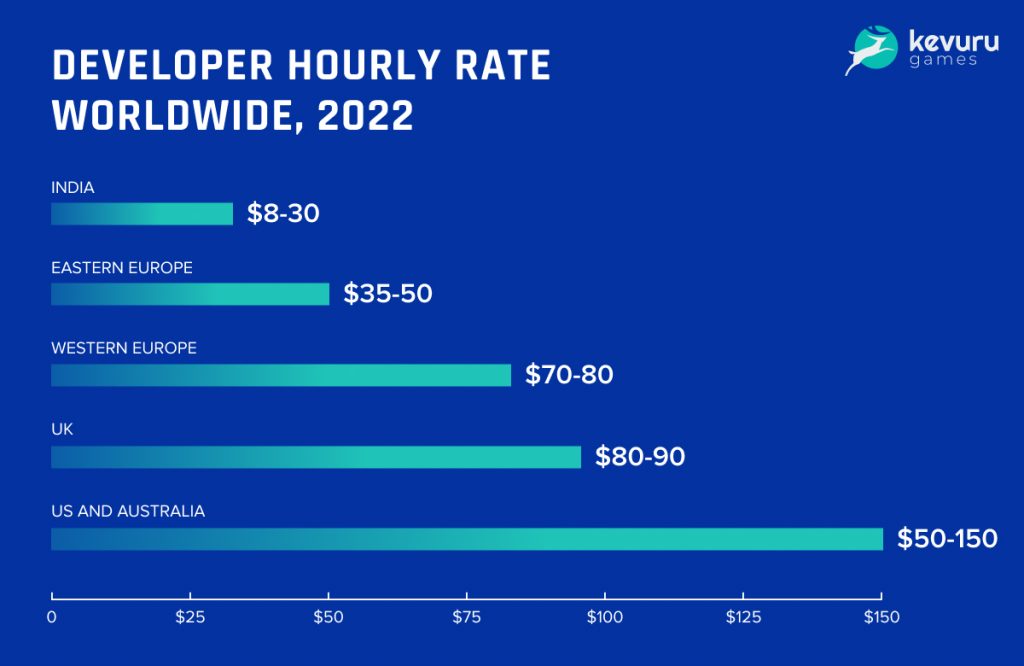
- The average salary for iOS developer vs Android developer in the US is roughly the same at $120,000. This indicates that both types of expertise are in demand on the market.
- In the UK, there is a slight bias towards prioritizing Android developers – here they receive $75,000 a year versus $70,000 for their iOS counterparts.
- India, on the other hand, values iOS experts more, paying them $4,800 a year, while Android experts are content with $4,200.
- Ukrainian iOS and Android developers are paid $35,000 and $30,000 a year, respectively.
Factors Affecting Development Time:
- Complexity of the application features and functionality.
- Availability and expertise of development resources.
- Integration with third-party services and APIs.
- Iterative development cycles and feedback loops.
- Project management efficiency and communication effectiveness.
However, in general, we see that the difference in salaries for specialists who are engaged in developing for Android vs iOS does not differ much around the world.
The Average Annual Salary of Android and iOS Developers
| Android | iOS | |
| US | $120,000 | $120,000 |
| UK | $75,000 | $70,000 |
| Ukraine | $30,000 | $35,000 |
| India | $4,200 | $4,800 |
Considering the above, we can see that the cost of the iOS app vs Android app may be higher for both the first and the second option, depending on the region where you hire developers, their qualifications, and the amount of time spent on creating the game app.
Publishing a Game in the Store
Let’s imagine that our game is ready, and all these Android vs iOS development perturbations are left behind. It’s time to show our marterpiece to the world and publish it on Google Play for Android or App Store for iOS. To do this, you need to purchase a developer account. And here the shops show their smiles in all their glory.
Google Play asks for a fairly modest one-time fee for lifetime access to your account, without making any particularly serious requirements or putting forward restrictions. In a few hours, you will be able to see your game in the store. Feel free to update or beta test it.
If you like a more sophisticated experience, then iOS can cater your whims. First, an App Store subscription costs $99 per year. Secondly, the process of approving the game and even updating it is very long and painstaking. You will definitely have to wait at least two days. At the same time, you can easily be refused if you violated at least one of the smallest rules of the store. To be successful, you need to thoroughly study these rules and always take into account the comments of the reviewers if they have already rejected your game.
In this regard, Google Play is much more human-oriented and loyal. It also allows the publisher to keep all revenue from in-app purchases, as opposed to iOS, which charges a 30% fee.
By the way, this fee became one of the main reasons why Epic Game entered into a confrontation with Apple. Another thing is that Apple users are often more financially stable people and more inclined to make in-game purchases. It is because of this that the App Store has a much higher income, even despite a relatively small market share.
We’ve analyzed the average cost of mobile games by type and complexity in our article on mobile development cost – check it if you are interested in specific numbers.
Factors affecting the price and clear estimates for casual, mid-level, and hardcore mobile games
Learn morePreliminary Conclusion
What to do if at this stage it is yet not clear which is better to choose – iOS or Android development? Do not worry, there is another way to form a clearer vector of your further actions. Each platform has a more or less specific target audience. Therefore, when deciding between iOS app vs Android app, pay attention to its geography and interests.
Portrait of the Average iOS User
People who prefer iOS:
- most live in North America, Western Europe, and Australia;
- are financially secure;
- are more likely to make in-app purchases.
If you rely on in-app purchases to monetize your game, then you definitely need iOS development.
Portrait of the Average Android User
People who prefer Android:
- most live in Asia, Central and Eastern Europe, and South America;
- are more loyal to different types of advertising in games;
- are sensitive to price and its relation to quality.
If your monetization strategy is displaying advertisements, then your choice is development for Android.
Android vs iOS Game Development: Pros and Cons of Platforms
| Pros | Cons | |
| Android | ✔ More users and downloads ✔ Fast publishing and less restrictions ✔ Effective monetization through advertising | ✘ Longer development time ✘ Lower average revenue ✘ More possible bugs |
| iOS | ✔ Higher average revenue ✔ Faster development ✔ Fewer possible bugs | ✘ Two times fewer users ✘ Long publishing with many restrictions ✘ The need to buy special hardware |
Kevuru Games Expertise in Mobile Game Development
Kevuru Games as mobile game development company offers comprehensive expertise in creating engaging and innovative gaming experiences for various platforms, including iOS and Android. With a team of skilled professionals, Kevuru Games leverages cutting-edge technologies and creative solutions to bring clients’ game concepts to life.
Our expertise in mobile game development encompasses:
- Conceptualization and Design: We work closely with clients to conceptualize game ideas and develop captivating gameplay experiences. Our team focuses on creating immersive narratives, engaging mechanics, and visually stunning designs that resonate with players.
- Development and Programming: Using industry-leading game engines and programming languages, our developers craft high-quality code to bring games to fruition. Whether it’s 2D or 3D, casual or complex, we have the technical proficiency to handle diverse game development projects.
- Art and Animation: Our talented artists and animators excel in creating captivating visuals and animations that enhance gameplay and immerse players in virtual worlds. From character design to environmental artwork, we strive for excellence in every aspect of game artistry.
- Sound and Music: We understand the importance of audio in creating memorable gaming experiences. Our sound designers and composers collaborate to craft immersive soundscapes and dynamic soundtracks that complement the gameplay and enhance player engagement.
- Quality Assurance: Rigorous testing is integral to ensuring the stability, performance, and user experience of mobile games. Our QA team meticulously tests games across various devices and platforms to identify and resolve bugs, glitches, and compatibility issues.
- Optimization and Monetization: We optimize games for performance and scalability, ensuring smooth gameplay experiences across different devices and screen sizes. Additionally, we provide expertise in monetization strategies, including in-app purchases, ads, and subscription models, to maximize revenue opportunities for our clients.
- Post-launch Support: Our commitment to client satisfaction extends beyond the initial launch of a game. We provide ongoing support and updates to address user feedback, introduce new features, and enhance the overall gaming experience over time.
At Kevuru Games, we are passionate about mobile game development and dedicated to delivering exceptional results for our clients.
Final Conclusion
At the beginning of our journey, we wondered about the differences between Android and iOS game development. Now the difference is clear, as are the individual advantages and disadvantages of the platforms that will help you make your final choice.
Mobile games will remain our true friends in 2022, even after the end of the pandemic or its new waves. Having fun in your pocket is always on point, so if you’re planning on making a game, it’s a great idea anyway. Another thing is how to do it so that you do not waste money and time, and your game attracts the attention of fastidious players.
Development of Android apps vs Apple apps has its advantages and nuances depending on your goals, audience, and monetization options that you intend to implement. And we are ready to become your guide in the world of mobile game creation.
All projects implemented by Kevuru Games have shown excellent download and user retention rates. We work both with Android and iOS separately, as well as with cross-platform development, which allows us to cover the entire pool of players and not miss the opportunity to increase the number of downloads and, accordingly, income.
Jump into our portfolio to make sure of our expertise and do not waste time – we always strive to create only outstanding products.










